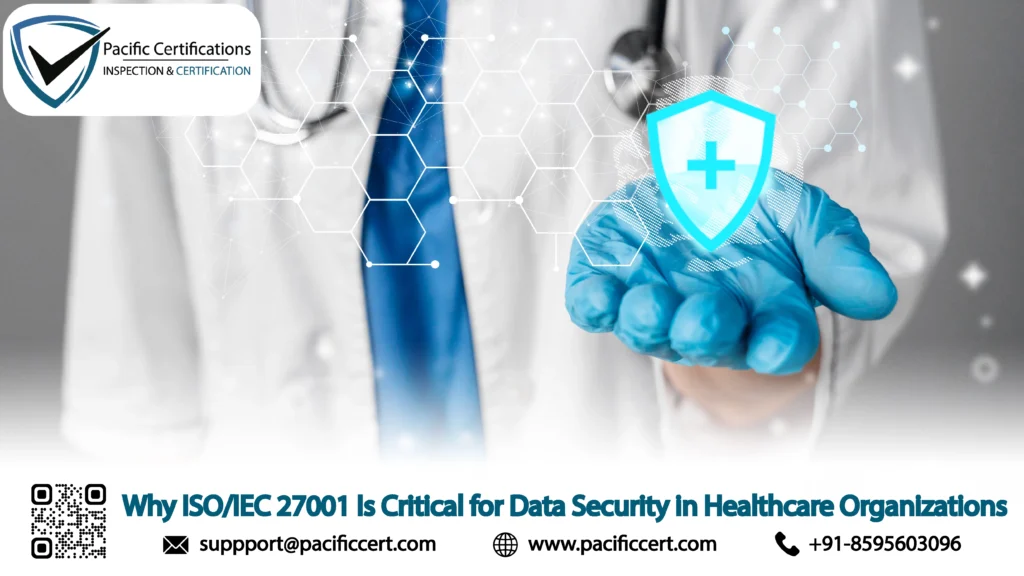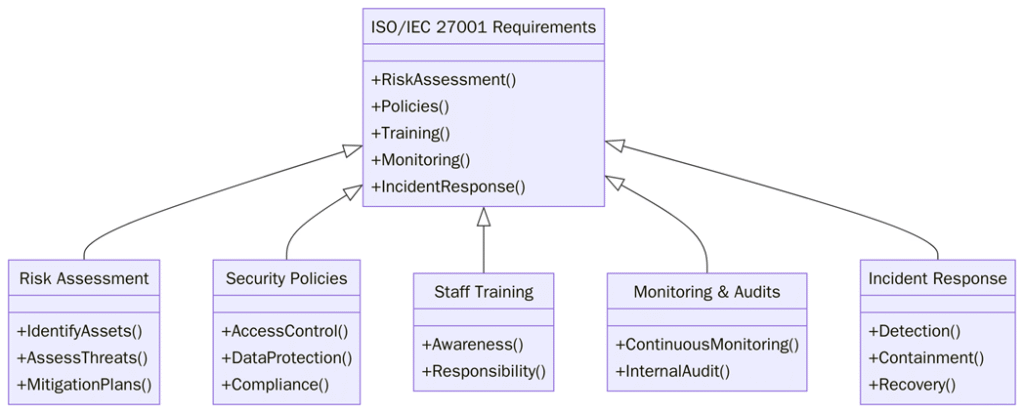
Healthcare organizations manage some of the most sensitive data in the world: patient health records, diagnostic results, insurance details and clinical research information. With digitization transforming the sector, the risks associated with data breaches and cyberattacks are growing rapidly. According to IBM’s 2024 Cost of a Data Breach Report, healthcare remains the most expensive industry for breaches, averaging $10.93 million per incident. This rising cost, combined with strict regulations such as HIPAA, GDPR and national health data laws, makes ISO/IEC 27001 certification a cornerstone for healthcare institutions that want to safeguard information and maintain trust.
Take the first step toward ISO/IEC 27001 certification with Pacific Certifications and safeguard data in your healthcare institution.
Quick summary
“ISO/IEC 27001 is the international standard for information security management systems (ISMS). In healthcare, it ensures that data confidentiality, integrity and availability are protected through structured risk assessments, access controls and monitoring. Certification demonstrates compliance with global benchmarks, reassures patients and regulators and reduces the likelihood of costly breaches.”
Why ISO/IEC 27001 matters for healthcare data security?
Healthcare organizations face unique risks compared to other industries. Cybercriminals target patient records because of their high black-market value, while insider threats and misconfigured systems pose constant vulnerabilities. A 2023 HIPAA Journal study reported that over 133 million healthcare records were exposed or stolen in the United States alone, highlighting the urgency of adopting strong security frameworks.
ISO/IEC 27001 matters because it offers a structured, evidence-driven approach to managing these risks. This reduces vulnerabilities, ensures staff are trained and builds confidence among patients, insurers and regulators. Certification also helps hospitals and clinics prove compliance with multiple overlapping regulations, streamlining audits and avoiding penalties. Most importantly, it positions healthcare organizations as trustworthy guardians of sensitive information in an era when data protection is a key driver of patient loyalty.
“Healthcare is now the number one target for cybercriminals. ISO/IEC 27001 is not just about compliance, it’s about safeguarding human lives by protecting the integrity of patient data.”
Relevant ISO standards for healthcare data security
| Standard | Focus area | Application in healthcare | Example evidence | Useful KPIs / SLAs |
| ISO/IEC 27001 | Information security management | Safeguarding patient health records, diagnostic data | ISMS policies, risk assessments | Incident response time, access review cadence |
| ISO/IEC 27701 | Privacy management | Managing patient consent and privacy rights | Consent logs, privacy notices | DSAR turnaround SLA, consent withdrawal time |
| ISO 9001:2015 | Quality management | Ensuring consistent delivery of patient services | SOPs, patient satisfaction surveys | Complaint closure time, NPS |
| ISO 22301 | Business continuity | Ensuring system uptime for critical healthcare IT | Recovery plans, test reports | Recovery time objective, system uptime SLA |
| ISO 14001 | Environmental management | Sustainability in healthcare operations | Environmental impact reports | Energy efficiency %, waste reduction % |
What are the ISO/IEC 27001 requirements in healthcare?
Healthcare institutions must adopt structured systems to protect sensitive patient data, prevent breaches and demonstrate accountability. These requirements go beyond technical safeguards to include governance, training and continual monitoring, ensuring that data protection becomes part of organizational culture. Below are some of the key requirements:

- Define the scope of the ISMS, including electronic health records, lab systems and connected devices.
- Develop security policies for access control, encryption and data handling.
- Conduct risk assessments covering external threats, insider risks and compliance obligations.
- Document evidence such as incident logs, access reviews and system monitoring reports.
- Train clinical and administrative staff on security protocols and responsibilities.
- Implement operational controls for user authentication, data backup and network monitoring.
- Carry out internal audits and correct nonconformities before external assessment.
- Run management reviews to evaluate KPIs such as breach response times and SLA performance.
- Provide corrective actions and demonstrate continual improvement.
Tip: Always align your ISMS with healthcare-specific regulations like HIPAA, GDPR or local health acts. This not only helps with compliance but also avoids duplication of audits.
How to prepare for ISO/IEC 27001 certification in healthcare?
Preparing for certification requires building a comprehensive ISMS that integrates security policies, risk assessments and monitoring tools across healthcare operations. Institutions that prepare thoroughly are better positioned to pass audits with minimal disruption.
- Conduct a gap analysis against ISO 27001 requirements.
- Update policies for patient data protection, consent and IT system security.
- Train staff across clinical, IT and administrative roles.
- Collect evidence such as penetration test results, audit logs and security dashboards.
- Conduct trial internal audits to detect weaknesses.
- Track KPIs such as system downtime, data access review cadence and incident closure time.
- Involve leadership to oversee compliance and resource allocation.
ISO/IEC 27001 Certification audit
The certification audit ensures that the ISMS aligns with ISO/IEC 27001 requirements and is consistently applied.
Stage 1 audit: Reviews policies, ISMS scope and documented risk assessments.
Stage 2 audit: Evaluates implementation across healthcare IT systems, records and staff practices.
Nonconformities: Must be corrected with documented proof before certification is granted.
Management review: Confirms leadership oversight and accountability.
Final certification: Awarded once compliance gaps are resolved.
Surveillance audits: Conducted annually to ensure continued compliance.
Recertification audits: Required every three years.
What are the benefits of ISO/IEC 27001 certification in healthcare?
The benefits of ISO/IEC 27001 certification for healthcare go well beyond compliance, directly strengthening patient trust and institutional credibility. By certifying, healthcare organizations demonstrate to patients, insurers and regulators that they are proactive in managing risks and safeguarding sensitive data. Certification also improves resilience, making organizations less vulnerable to disruptions and penalties. Below are some of the key benefits:

- Reduced risk of data breaches and associated financial losses.
- Increased patient trust and stronger reputation for safeguarding sensitive information.
- Streamlined compliance with regulations such as HIPAA and GDPR.
- Improved staff awareness and accountability through structured training.
- Better incident response times and SLA compliance.
- Stronger position in attracting partnerships, contracts and international recognition.
In recent years, healthcare institutions are adopting integrated certification frameworks that combine ISO/IEC 27001 with ISO/IEC 27701 for privacy and ISO 22301 for continuity. Cybersecurity threats targeting hospitals, including ransomware and phishing attacks have accelerated investment in ISO-certified systems, with KPIs such as incident resolution time and audit closure rates now becoming mandatory for regulatory audits. Healthcare organizations are also implementing AI-driven monitoring tools for anomaly detection, linking them to ISO frameworks to demonstrate proactive governance. Certification is increasingly viewed as both a regulatory safeguard and a competitive advantage in the healthcare sector.
A recent search from IBM confirms that healthcare organizations with mature security frameworks reduce breach costs by 28% on average compared to peers without structured systems (source). Similarly, GDPR enforcement records show that hospitals with ISO/IEC 27001 certification face significantly lower fines, since documented ISMS controls provide mitigating evidence during investigations.
How Pacific Certifications can help?
Pacific Certifications provides accredited ISO/IEC 27001 certification services for healthcare organizations. Our audits help institutions prove compliance, protect patient data and build international credibility in an increasingly digital healthcare landscape.
Request your ISO audit plan and fee estimate, we will help you map Stage 1 and Stage 2 timelines and evidence requirements for your institution. Contact us at support@pacificcert.com or visit www.pacificcert.com.
FAQs
Why is ISO/IEC 27001 critical for healthcare organizations?
Because it protects sensitive patient data, reduces breach risks and ensures compliance with regulations.
Which ISO standards complement ISO/IEC 27001 in healthcare?
ISO/IEC 27701 for privacy, ISO 22301 for continuity, ISO 9001 for quality and ISO 14001 for sustainability.
How long does ISO 27001 certification take in healthcare?
Usually 6–12 months, depending on the size and complexity of the institution.
What evidence do auditors look for?
Risk assessments, penetration test results, access control logs and staff training records.
Does ISO 27001 replace HIPAA compliance?
No, but it complements HIPAA and provides a globally recognized framework for compliance.
Can small clinics achieve ISO 27001 certification?
Yes, the standard is scalable for small practices as well as large hospitals.
How does certification improve patient trust?
It reassures patients that their data is protected under internationally recognized standards.
What KPIs should healthcare institutions track?
Incident response time, downtime frequency, SLA performance and access review cadence.
How often are surveillance audits required?
Annually, with recertification every three years.
What are the long-term benefits of certification?
Reduced risks, stronger compliance posture, improved resilience and greater patient confidence.
Ready to get ISO/IEC 27001 certified?
Contact Pacific Certifications to begin your certification journey today!
Suggested Certifications –
Read more: Pacific Blogs

Author: Alina Ansari





